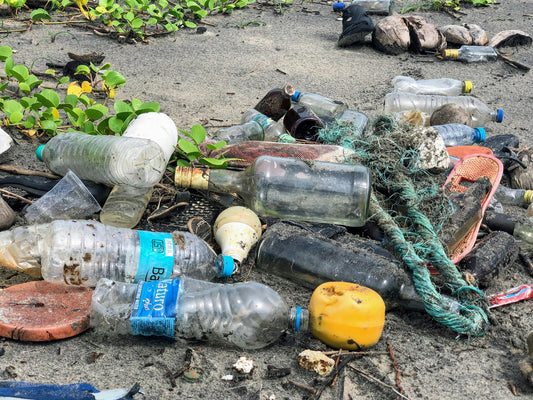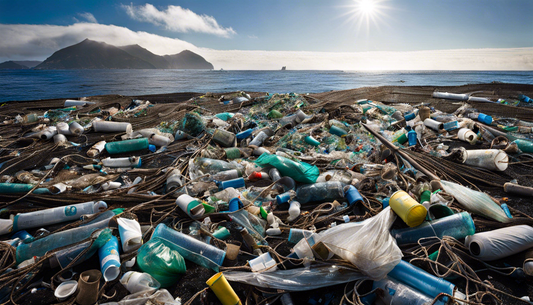Share
Today, as environmental awareness has risen, the consumer has become more selective and pays attention to the environmental friendliness of the purchased products.
It has made many firms demonstrate their concern for sustainability.
However, many brands don’t focus on genuine actions and intentions to promote sustainability; they only care about establishing a positive image, which may be best described as greenwashing.
Apple, a leading technology company globally, has long bragged about its ecological programs.
However, the question remains whether Apple is committed to environmentalism, or is it just painting the company in a more sustainable light.
In this blog post, we will discuss Apple's real environmental initiatives and whether It has been guilty of greenwashing.
What are Apple's Eco-Friendly Initiatives?
Before going further, it is important to note that in recent years, Apple has done a lot in environmental sustainability.
It is important to distinguish their genuine environmental programs from greenwashing attemps.

Apple Park
Apple Park, located in Cupertino, California, is one of the company's new major buildings. It opened in April 2017 as the company's main headquarters.
The campus is powered solely by solar energy collected from solar panels. Recently, 9000 new trees have been planted, and an on-site garden has been established, which proves Apple’s commitment to sustainability.
Apple has remained consistent in its use of renewable power, making it a policy that its stores, data centers, and other offices are powered solely by renewable energy.
Renewable Energy Projects in China
Apple has invested in clean energy projects in the country to address the severe air pollution problem in China due to the extensive use of coal.
By creating the China Clean Energy Fund, which has an investment figure of close to $300 million, Apple will be able to produce about one gigawatt of renewable energy, sufficient to power approximately one million homes.
This initiative not only increases the buying capacity of the stakeholders but also promotes the use of various cleaner energy products.
Recycling and Robots
Electronic waste does not only find its way to water bodies but also to developing countries.
Most of the developing countries will set low tariffs for big firms to dump their waste in other countries.
Sadly, electronic waste poses a threat to human health since it results in increased toxic exposure and contains known carcinogens (cancer inducing chemicals).
To address the issue of e-waste management, especially in the developing world, Apple developed a robot named Liam in 2017. It can dismantle up to 1.2 million iPhones annually and sort recyclable parts from non-recyclable ones.
What Are Some Greenwashing Accusations That Apple Faced?

Use of Carbon Credits
The concept of carbon credits is relatively straightforward: Businesses make investments in activities that either decrease greenhouse gas emissions or capture carbon dioxide from the air.
As compensation, they get credits that can be used to balance their own emissions.
Apple has also used carbon credits within its overall environmental plan, hoping to offset its carbon footprint by supporting activities such as forest preservation or the use of renewable energy sources.
While these investments can have positive environmental effects, critics point out that they do not guarantee reduced emissions.
In the context of Apple, although the company has invested in renewable energy and other sustainability measures, purchasing credits might not be enough to prompt change in the long run.
Lack of Transparency
It is crucial for any company to be honest and clear with its customers, and this is especially true when it comes to environmental issues.
Nevertheless, Apple has been criticized for its environmental communication and initiatives, which some consider vague and not very specific.
Some critics claim that although Apple regularly touts its sustainability efforts and milestones, it provides vague information that cannot be deemed sufficient for stakeholders to assess the company’s environmental footprint.
This lack of transparency is a concern and could indicate that Apple’s environmental report may not be entirely accurate or complete.
Another criticism is that Apple’s sustainability reports and marketing campaigns often include many goals and accomplishments but do not contain the necessary data or numbers.
While the company may boast about its efforts to use renewable energy, reduce waste, and so on, it tends to lack details about the environmental impact of the products at various stages in its life cycle.
Frequent Updates
Every time Apple introduces a new product, people buy the new products and discard the old ones.
These old electronics are disposed of in landfills or shipped to third-world countries, where they are disposed of in a very wrong way, polluting the environment and posing health problems to the people.
Apple’s continuous release of new products and product designs that focus on appearance and functionality over durability and modularity increases the e-waste issue.
Some critics have claimed that Apple directly promotes the culture of disposability by making it either expensive or nearly impossible for consumers to repair or upgrade their devices.
In addition, Apple's closed-loop nature of its hardware, software, and services can put more pressure on consumers to upgrade their devices.
They might be pressured to buy a new iPhone or MacBook because the latest software updates are incompatible with older hardware.
Recent Planned Obsolescence

France is investigating Apple over claims that it is preparing smartphones to become obsolete to limit their repair.This is called Planned Obsolescence.
According to the Paris prosecutor's office, the investigation into alleged deceptive sales tactics and planned product degradation started in December 2023.
This came after an application by the Halt Planned Obsolescence (HOP) Association.
HOP stated that it wanted the investigation to show that Apple was “linking the serial numbers of spare parts to those of a smartphone, including through chips, thereby enabling the manufacturer to prevent independent repairers from fixing the device or to deliberately degrade a smartphone repaired with non-genuine components.”
The association urged Apple to “ensure the right to repair devices under the assumptions of a truly circular economy.”
In 2020, Apple agreed to pay 25 million euros (or $27. 4 million) for not informing iPhone users that updates to the operating system could slow down older phones.
Saving Costs Under The Disguise of Sustainability
Apple is known for its continuous product innovation. Sometimes that means getting rid of product features that the Apple designers deem unnecessary.
In 2016, for example the company removed the headphone jack from its smartphones.
What first caused an uproar, soon became the standard in the market, as bluetooth headphones found more and more adaption.
In 2020 apple announced that it will no longer provide chargers in their packages, which the company said will reduce e-waste and reduce packaging size. Consequently, “70% more devices can fit on a shipping pallet”, and “reduce yearly carbon emissions by 2 million metric tons”
The argument was that most customers would be able to use the more than 2 billion iPhone chargers already in the market.
Many argued that this move was merely a PR stunt that clearly qualifies as Greenwashing, as all chargers shipped before 2020 were not compatible with the new USB-C to lightning cable from newer iPhone models.
The announcement was uncovered to be misguiding consumers and still forcing them to buy new apple accessories, leading to increased profits for the company.
Consumers Need to Demand Transparency
Like most big companies of the world, Apple has been criticized for greenwashing. At the same time, Apple has also played some key roles in creating eco-friendly practices.
Through its innovative strategies to minimize the impact on the environment, Apple has set some benchmarks in the field of sustainability.
Unfortunately, it is difficult to evaluate if these genuine efforts counter the company’s significant environmental footprint.
Especially due to its significant influence on provoking overconsumption, Apple needs to show more transparency around the footprint of its products.
What is your opinion of Apple's greenwashing accusations? Feel free to leave a comment below.
We hope you enjoyed this article. If you want to read more like this, make sure to check out our Blog and follow us on Instagram. If you are interested in truly sustainable products, check out our Shop.








